
MIRTAZAPINE TARBIS 15 mg ORALLY DISINTEGRATING TABLETS
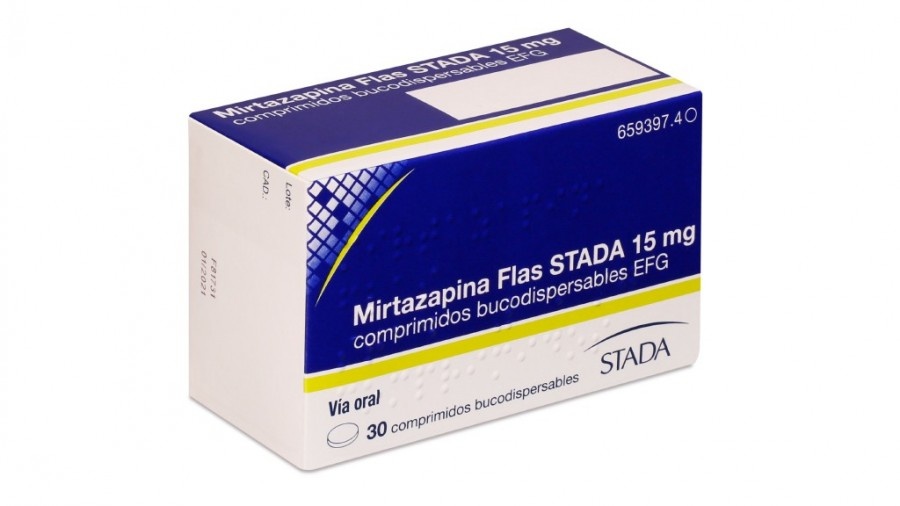

How to use MIRTAZAPINE TARBIS 15 mg ORALLY DISINTEGRATING TABLETS
Translated with AI
This page provides general information and does not replace a doctor’s consultation. Always consult a doctor before taking any medication. Seek urgent medical care if symptoms are severe.
Show originalContents of the leaflet
Introduction
Package Leaflet: Information for theuser
Mirtazapine TARBIS 15 mg orodispersible tablets EFG
Read the entire package leaflet carefully before starting to take this medication, as it contains important information for you.
- Keep this package leaflet, as you may need to read it again
- If you have any questions, consult your doctor or pharmacist
- This medication has been prescribed to you only, and you should not give it to others, even if they have the same symptoms as you, as it may harm them
- If you experience side effects, consult your doctor or pharmacist, even if they are not listed in this package leaflet
Contents of the package leaflet:
- What is Mirtazapine Tarbis and what is it used for
- What you need to know before taking Mirtazapine Tarbis
- How to take Mirtazapine Tarbis
- Possible side effects
- Storage of Mirtazapine Tarbis
- Package contents and additional information
1. What is Mirtazapine Tarbis and what is it used for
Mirtazapine Tarbis belongs to the group of medications called antidepressants
Mirtazapine is used to treat depression
2. What you need to know before taking Mirtazapine Tarbis
Do not take MirtazapineTarbis
- if you are allergic (hypersensitive) to the active substance or any of the other components of this medication (listed in section 6). In this case, consult your doctor as soon as possible before taking Mirtazapine Tarbis
- if you are taking or have recently taken (in the last two weeks) medications called monoamine oxidase inhibitors (MAOIs)
DO NOT TAKE - OR CONSULT YOUR DOCTOR BEFORE STARTING TO TAKE MIRTAZAPINE TARBIS:
If you have ever suffered from a severe skin rash or skin peeling, blisters, or sores in the mouth after taking mirtazapine or other medications
Warnings and precautions
Consult your doctor or pharmacist before starting to take Mirtazapine Tarbis
Use in children and adolescents under 18 years
Mirtazapine Tarbis should not normally be used in the treatment of children and adolescents under 18 years. However, you should know that in patients under 18 years, there is a higher risk of side effects such as suicidal attempts, suicidal ideation, and hostility (mainly aggression, confrontational behavior, and irritation) when taking this class of medications. Nevertheless, your doctor may prescribe Mirtazapine Tarbis to patients under 18 years when they decide it is most convenient for the patient. If your doctor has prescribed Mirtazapine Tarbis to a patient under 18 years and you wish to discuss this decision, please return to your doctor. You should inform your doctor if any of the symptoms listed above appear or worsen in patients under 18 years taking Mirtazapine Tarbis. Additionally, the long-term safety effects related to growth, maturity, and development of knowledge and behavior of mirtazapine in this age group are still unknown
Suicidal thoughts and worsening of your depression or anxiety disorder
If you are depressed and/or suffer from anxiety disorder, you may occasionally have thoughts of self-harm or suicide. These may increase when taking antidepressants for the first time, as these medications require time to start taking effect, usually around two weeks, although in some cases it may take longer
You would be more likely to have these thoughts:
- If you have previously had thoughts of self-harm or suicide
- If you are a young adult. Clinical trial information has shown an increased risk of suicidal behaviors in young adults (under 25 years) with psychiatric disorders and who were treated with an antidepressant
?If at any time you have thoughts of self-harm or suicide, consult your doctor or go directly to a hospital
It may be helpful for you to tell a relative or close friendthat you are depressed or have an anxiety disorder, and ask them to read this package leaflet. You can ask them if they think your depression or anxiety disorder has worsened, or if they are concerned about changes in your behavior
Also, be especially careful with Mirtazapine Tarbis:
- if you have or have ever had any of the following disorders
?Inform your doctor about these situations before taking Mirtazapine Tarbis, if you have not already:
- seizures(epilepsy). If seizures appear or are more frequent, stop taking mirtazapine and contact your doctor immediately
- liver disease, including jaundice. If jaundice appears, stop taking mirtazapine and contact your doctor immediately
- kidney disease
- heart diseaseor low blood pressure
- schizophrenia. If psychotic symptoms, such as paranoid thoughts, are more frequent or severe, contact your doctor immediately
- bipolar depression(alternating periods of excitement/hyperactivity and periods of depression). If you start to feel excited or overexcited, stop taking mirtazapine and contact your doctor immediately
- diabetes(you may need to adjust your insulin or other antidiabetic medication dose)
- eye diseases, such as increased pressure in the eye (glaucoma)
- difficulty urinating, which may be due to an enlarged prostate
- if signs of infection appear, such as unexplained high fever, sore throat, and mouth sores
?Stop taking Mirtazapine Tarbis and contact your doctor immediately to have a blood test. In rare cases, these symptoms can be signs of alterations in blood cell production in the bone marrow. Although rare, these symptoms usually appear 4-6 weeks after treatment
- if you are an elderly person, you may be more sensitive to the adverse effects of antidepressant medications
- serious skin reactions have been reported with the use of mirtazapine, such as Stevens-Johnson syndrome (SJS), toxic epidermal necrolysis (TEN), and drug reaction with eosinophilia and systemic symptoms (DRESS). Discontinue use and seek medical attention immediately if you notice any of the symptoms described in section 4 related to these serious skin reactions
- if you have ever suffered from serious skin reactions, do not restart treatment with mirtazapine
Using Mirtazapine Tarbis with other medications
Tell your doctor or pharmacist if you are taking (or are going to take) any of the medications on the following list
Also, inform your doctor or pharmacist if you are using, have recently used, or may need to use any other medication
Do not take Mirtazapine Tarbiswith:
- monoamine oxidase inhibitors(MAOIs). Also, do not take mirtazapine during the two weeks after stopping MAOIs. If you stop taking mirtazapine, do not take MAOIs for the next two weeks
Examples of MAOIs are moclobemide, tranilcipromine (both are antidepressants), and selegiline (for Parkinson's disease)
Be careful ifyou take Mirtazapine Tarbis with:
- antidepressants such as selective serotonin reuptake inhibitors (SSRIs), venlafaxine, and L-tryptophan or triptans(used for migraines), tramadol(for pain), linezolid(an antibiotic), lithium(used to treat some psychiatric disorders), and St. John's Wort – Hypericum perforatum(a medicinal plant for depression). In rare cases, mirtazapine alone or with these medications can cause a condition called serotonin syndrome. Some symptoms of this syndrome are: unexplained fever, sweating, palpitations, diarrhea, muscle contractions (involuntary), shivering, exaggerated reflexes, agitation, mood changes, and loss of consciousness. If you experience a combination of these symptoms, consult your doctor immediately
- the antidepressant nefazodone. It can increase the amount of mirtazapine in the blood. Inform your doctor if you are taking this medication. It may be necessary to decrease the dose of mirtazapine or increase it again when stopping nefazodone
- medications for anxiety or insomniasuch as benzodiazepines
medications for schizophreniasuch as olanzapine
medications for allergiessuch as cetirizine
medications for severe painsuch as morphine
When combined with these medications, mirtazapine can increase the drowsiness caused by these medications
- medications for infections:medications for bacterial infections (such as erythromycin), medications for fungal infections (such as ketoconazole), and medications for HIV/AIDS (HIV protease inhibitors)
If taken with mirtazapine, these medications can increase the amount of mirtazapine in the blood. Inform your doctor if you are taking these medications. It may be necessary to decrease the dose of mirtazapine or increase it again when stopping these medications
- medications for epilepsysuch as carbamazepine and phenytoin; medications for tuberculosissuch as rifampicin
If taken with mirtazapine, these medications can decrease the amount of mirtazapine in the blood. Inform your doctor if you are taking these medications. It may be necessary to increase the dose of mirtazapine or decrease it again when stopping these medications
- medications to prevent blood clottingsuch as warfarin
Mirtazapine can increase the effects of warfarin on the blood. Inform your doctor if you are taking this medication. In case of taking them together, it is recommended that your doctor perform blood tests
Taking Mirtazapine Tarbis with food, drinks, and alcohol
You may feel drowsy if you drink alcohol while being treated with mirtazapine
It is recommended not to drink any alcohol
You can take mirtazapine with or without food
Pregnancy, breastfeeding, and fertility
Consult your doctor or pharmacist before using any medication
Limited experience with the administration of mirtazapine to pregnant women does not indicate an increased risk. However, caution should be exercised if used during pregnancy
If you are pregnant or breastfeeding, think you may be pregnant, or plan to become pregnant, consult your doctor or pharmacist before using this medication. If you use mirtazapine until or shortly before delivery, your child will be examined for possible adverse effects
If you are taking mirtazapine during pregnancy, tell your midwife and/or doctor. When similar medications (called selective serotonin reuptake inhibitors: SSRIs) are taken during pregnancy, it may increase the risk of the baby suffering from a serious disease called persistent pulmonary hypertension of the newborn (PPHN), causing the child to breathe faster and appear blue. These symptoms usually start within the first 24 hours after birth. If this occurs, you should contact your doctor and/or midwife immediately
Consult your doctor if you can breastfeed while taking Mirtazapine Tarbis
Driving and using machines
Mirtazapine Tarbis can affect your concentration or alertness
During treatment with Mirtazapine Tarbis, you may feel drowsy or dizzy. Do not drive or operate tools or machines until you know how the treatment with Mirtazapine Tarbis affects you
Mirtazapine Tarbis contains aspartame
This medication can be harmful to people with phenylketonuria because it contains aspartame, which is a source of phenylalanine
3. How to take Mirtazapine Tarbis
Follow exactly the administration instructions of this medication indicated by your doctor or pharmacist. In case of doubt, consult your doctor or pharmacist again
How much to take
The usual initial dose is 15 or 30mg per day. Your doctor may recommend increasing the dose after a few days to the amount that is best for you (between 15 and 45 mg per day). Normally, the dose is the same for all ages. However, if you are an elderly person or have kidney or liver disease, your doctor may change the dose
When to take it
?Take Mirtazapine Tarbis at the same time every day
It is best to take the dose of mirtazapine once before bedtime. However, your doctor may recommend that you divide your dose of mirtazapine in the morning and before bedtime. The highest dose should be taken before bedtime
Take the orodispersible tablet as follows
The tablets are taken orally
- Do not press the orodispersible tablet
To avoid crushing the orodispersible tablet, do not press the blister (Figure A)

Fig. A
- Separate a blister
Each blister pack contains six blisters, which are separated by perforations. Separate a blister following the perforated lines (Figure 1)
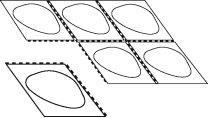
Fig. 1
- Open the blister
Carefully remove the foil, starting from the corner indicated by the arrow (Figures 2 and 3)
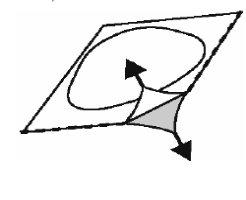
Fig. 2
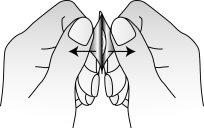
Fig. 3
- Remove the orodispersible tablet
Remove the orodispersible tablet with dry hands and place it on your tongue (Figure 4)
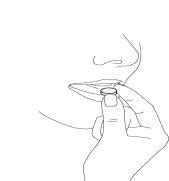
Fig. 4
It will dissolve quickly and can be swallowed without water
When can you expect to feel better
Normally, Mirtazapine Tarbis will start to take effect after 1 or 2 weeks, and after 2 to 4 weeks, you may start to feel better. It is essential that during the first weeks of treatment, you talk to your doctor about the effects of mirtazapine
?Between 2 and 4 weeks after starting to take mirtazapine, talk to your doctor about how this medication has affected you
If you still do not feel better, your doctor may prescribe a higher dose. In that case, talk to your doctor again after another 2-4 weeks
Normally, you will need to take mirtazapine until the symptoms of depression have disappeared for 4-6 months
If you take more Mirtazapine Tarbisthan you should
?If you or someone else takes too much Mirtazapine Tarbis, consult a doctor immediately. You can also call the Toxicology Information Service, phone 91 562 04 20
The most likely symptoms of a mirtazapine overdose (without other medications or alcohol) are drowsiness, disorientation, and palpitations
If you forget to take Mirtazapine Tarbis
If you need to take your dose once a day
- if you forget to take your dose of mirtazapine, do not take the missed dose. Skip it and take your usual dose the next day
If you need to take your dose twice a day
- if you have forgotten the morning dose, simply take it with the evening dose
- if you have forgotten the evening dose, do not take it the next morning; skip it and continue with your normal doses in the morning and evening
- if you have forgotten both doses, do not try to make them up. Skip both doses and the next day continue with your normal dose in the morning and evening
If you stop taking Mirtazapine Tarbis
?Stop taking mirtazapine only if you consult your doctor
If you stop too soon, depression may reappear. When you feel better, talk to your doctor. Your doctor will decide when you can stop treatment
Do not stop taking mirtazapine abruptly, even if depression has disappeared. If you stop taking mirtazapine abruptly, you may feel sick, dizzy, agitated, or anxious, and have headaches. These symptoms can be avoided by gradually stopping treatment. Your doctor will indicate how to gradually decrease the dose
If you have any other questions about the use of this medication, ask your doctor or pharmacist
4. Possible Adverse Effects
Like all medicines, Mirtazapine Tarbis can cause adverse effects, although not all people suffer from them.
Some adverse effects are more likely than others. The possible adverse effects of mirtazapine are indicated below and can be divided into:
- Very Common:affect more than 1 in 10 patients
- Common:affect between 1 and 10 in 100 patients
- Uncommon:affect between 1 and 10 in 1,000 patients
- Rare:affect between 1 and 10 in 10,000 patients
- Very Rare:affect less than 1 in 10,000 patients
- Unknown:cannot be estimated from the available information
Very Common:
- increased appetite and weight gain
- drowsiness
- headache
- dry mouth
Common:
- lethargy
- dizziness
- tremor
- nausea
- diarrhea
- vomiting
- constipation
- urticaria or skin rash (exanthema)
- joint pain (arthralgia) or muscle pain (myalgia)
- back pain
- dizziness or fainting when standing up quickly (orthostatic hypotension)
- swelling (usually in ankles or feet) due to fluid retention (edema)
- fatigue
- vivid dreams
- confusion
- anxiety
- difficulty sleeping
- memory problems, which in most cases were resolved when treatment was discontinued.
Uncommon:
- feeling of exaggerated euphoria (mania)
? Stop taking mirtazapine and consult your doctor immediately.
- strange sensation in the skin, such as burning, pinching, tingling, or numbness (paresthesia)
- involuntary movements of the legs during sleep
- fainting (syncope)
- numbness in the mouth (oral hypoesthesia)
- low blood pressure
- nightmares
- agitation
- hallucinations
- inability to remain still
Rare:
- yellowing of the eyes or skin; may suggest liver function alterations (jaundice).
? Stop taking mirtazapine and consult your doctor immediately.
- twitching or muscle contractions (myoclonus)
- pancreatitis
Unknown Frequency:
- signs of infection such as high, unexplained, and sudden fever, sore throat, and mouth ulcers (agranulocytosis).
? Stop taking mirtazapine and consult your doctor immediately to have a blood test.
In rare cases, mirtazapine may cause alterations in blood cell production (bone marrow depression). Some people become less resistant to infections because mirtazapine can cause a temporary decrease in white blood cells (granulocytopenia). In rare cases, mirtazapine can also cause a decrease in red and white blood cells and platelets (aplastic anemia), a decrease in platelets (thrombocytopenia), or an increase in the number of white blood cells in the blood (eosinophilia).
- epileptic seizure (convulsions).
? Stop taking mirtazapine and consult your doctor immediately.
- combination of symptoms such as unexplained fever, sweating, palpitations, diarrhea, muscle contractions (involuntary), chills, exaggerated reflexes, agitation, mood changes, and loss of consciousness. In very rare cases, these symptoms can be signs of a disorder called "serotonin syndrome".
? Stop taking mirtazapine and consult your doctor immediately.
- thoughts of self-harm or suicide
? Stop taking mirtazapine and consult your doctor immediately.
- abnormal sensations in the mouth (oral paresthesia)
- swelling in the mouth (oral edema)
- hyponatremia
- inadequate secretion of antidiuretic hormone
- increased levels of creatine kinase in the blood
- difficulty urinating (urinary retention)
- muscle pain, stiffness, and/or weakness, darkening or discoloration of urine (rhabdomyolysis).
- red patches on the trunk, like circumscribed or circular macules, often with blisters in the center, skin peeling, ulcers in the mouth, throat, nose, genitals, and eyes. These severe skin rashes can be preceded by fever and flu-like symptoms (Stevens-Johnson syndrome, toxic epidermal necrolysis) ? Stop taking mirtazapine and consult your doctor immediately.
- generalized erythema, elevated body temperature, and enlarged lymph nodes (DRESS syndrome or drug hypersensitivity syndrome) ? Stop taking mirtazapine and consult your doctor immediately.
If you experience adverse effects, consult your doctor or pharmacist, even if they are adverse effects that do not appear in this leaflet.
Adverse Effect Reporting:
If you experience any type of adverse effect, consult your doctor or pharmacist, even if it is a possible adverse effect that does not appear in this leaflet. You can also report them directly through the Spanish Pharmacovigilance System for Human Use Medicines: https://www.notificaram.es. By reporting adverse effects, you can contribute to providing more information on the safety of this medicine.
5. Storage of Mirtazapine
Keep this medicine out of sight and reach of children.
Do not use this medicine after the expiration date that appears on the packaging and on the blister after CAD. The expiration date is the last day of the month indicated.
Do not store at a temperature above 25°C.
Store in the original packaging to protect it from light and moisture
Medicines should not be thrown down the drain or into the trash. Deposit the packaging and medicines you no longer need at the SIGRE Point in the pharmacy. In case of doubt, ask your pharmacist how to dispose of the packaging and medicines you no longer need. This way, you will help protect the environment.
6. Package Contents and Additional Information
Composition of Mirtazapine Tarbis
- The active ingredient is mirtazapine.
Mirtazapine Tarbis 15 mg oral dispersible tablets contain 15 mg of mirtazapine per tablet.
- The other components are: mannitol, microcrystalline cellulose, magnesium carbonate, low-substitution hydroxypropylcellulose, anhydrous colloidal silica, L-methionine, crospovidone, microcrystalline cellulose, and guar gum (Avicel CE-15), aspartame (E951), orange silesia flavor, and magnesium stearate.
Appearance of the Product and Package Contents
Mirtazapine Tarbis 15 mg oral dispersible tablets are white, round, biconvex, and marked with 'M1' on one face.
The oral dispersible tablets are packaged in child-resistant blisters, perforated for unit dosage.
The following package sizes are available: 30 oral dispersible tablets.
Marketing Authorization Holder and Manufacturer
Marketing Authorization Holder:
TARBIS FARMA, S.L.
Gran Vía Carlos III, 94
08028-Barcelona (Spain)
Manufacturer
Actavis HF
Reyjavikuvegur 78
220 Hafnarfjordur
Iceland
Ó
Actavis Limited
BLB 016 Bulebel Industrial Estate
Zejtun ZTN 3000
Malta
Date of the Last Revision of this Leaflet:October 2020
Detailed and updated information on this medicine is available on the website of the Spanish Agency for Medicines and Health Products (AEMPS) http://www.aemps.gob.es/
- Country of registration
- Average pharmacy price8.52 EUR
- Active substance
- Prescription requiredYes
- Manufacturer
- This information is for reference only and does not constitute medical advice. Always consult a doctor before taking any medication. Oladoctor is not responsible for medical decisions based on this content.
- Alternatives to MIRTAZAPINE TARBIS 15 mg ORALLY DISINTEGRATING TABLETSDosage form: TABLET, 15 mgActive substance: mirtazapineManufacturer: Laboratorios Alter S.A.Prescription requiredDosage form: TABLET, 30 mgActive substance: mirtazapineManufacturer: Laboratorios Alter S.A.Prescription requiredDosage form: TABLET, 15 mgActive substance: mirtazapineManufacturer: Almus Farmaceutica S.A.U.Prescription required
Online doctors for MIRTAZAPINE TARBIS 15 mg ORALLY DISINTEGRATING TABLETS
Discuss questions about MIRTAZAPINE TARBIS 15 mg ORALLY DISINTEGRATING TABLETS, including use, safety considerations and prescription review, subject to medical assessment and local regulations.
Frequently Asked Questions











